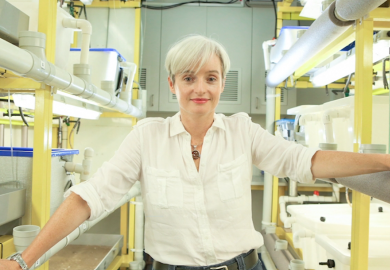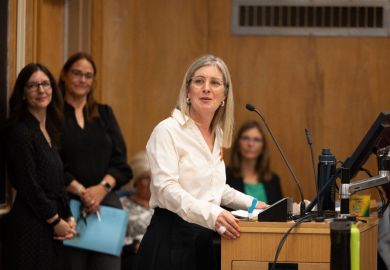The pressures on university leaders are greater than ever – and “brave leadership”, which includes the need to show “vulnerability” and to be transparent, is being billed by some experts as the solution for leaders and their institutions.
Brave leadership will be the central theme of the leadership summit being organised by Advance HE – the UK sector organisation that supports improved practice in fields including leadership – in Birmingham on 5 June.
At a time of policy turbulence in UK higher education and a spate of sudden exits for several vice-chancellors, leadership is under greater scrutiny than ever. But what does it mean to be a “brave” leader in such an era?
Doug Parkin, principal adviser for leadership and management at Advance HE, divides brave leadership into “bravery of the mind”, “bravery of the heart” and “bravery of action”.
Bravery of the mind is being able to “really penetrate what’s going on” in the “incredibly complex environment we are currently operating in”, Mr Parkin said.
Engaging with and having empathy with others and trying to create a “courageous culture where people can be both creative and candid” represents bravery of the heart.
And bravery of action is being able to “determine collaboratively the route to go down and to be aware that that might not be right”, he said.
It is not about bravery in a “heroic” sense or being a strong, authoritarian leader, rather a move away from an “age of authority” to an “age of trust and engagement”, Mr Parkin argued.
“Courage and vulnerability, I think, are the two things that go hand in hand with it,” he said. “So courage about being clear and transparent about the challenges that each organisation faces is one aspect, but also courage in terms of emotional intelligence and self-disclosure.
“So the way that I have approached it, is to think about both letting the outside in and the inside out.”
Leaders should look to develop a culture in which people are “fearless about speaking out or speaking up or bringing to the table their own thoughts”, Mr Parkin continued.
Trying to be invulnerable “closes things down” and has the potential to limit trust, while “personal vulnerability and personal disclosure and emotional transparency” open up a “deeper level of engagement”, he argued.
Tensions and challenges facing UK higher education leaders include the struggle to compete in the new higher education market, uncertainty surrounding Brexit, rising pension costs, clashes over stagnant staff pay and the requirement for institutions to address climate change.
Mr Parkin viewed it as a “waiting game to see what a particular policy may actually produce, a waiting game to see where the political chess pieces are going to move next”.
“I think that brave leadership matches complexity and uncertainty and also tensions developing in a system," he added.
With recent examples of high-profile leadership turbulence at De Montfort and Swansea universities as well as management failures elsewhere, are there risks to brave leadership as well as rewards?
“I think in terms of institutional engagement, courage and vulnerability are important, but that opens you up to a degree of fallibility as well,” said Mr Parkin.
“It’s not about heroically determining a single course, I think rather than a closed approach, brave leadership is increasingly calling for an open approach,” he added.
For Mary Stuart, vice-chancellor of the University of Lincoln and one of the summit panellists, brave leadership is about “being authentic and very much yourself in what you do”.
“I am not sure that is that ‘brave’ in reality. I can’t imagine being anything other than myself,” she added.
“I fully believe in this day and age that transparency and authenticity are vital. There has been an old view of leadership which is very hierarchical and closed, but it just won’t wash in the age we are in.”
Professor Stuart was told that it was a “brave” decision to start offering pharmacy courses at Lincoln – but saw it as a “no-brainer” given that the area needed pharmacists.
She added: “But that is not what brave leadership is; being ‘brave’ in leadership terms means being yourself with people and learning from everyone and not ever believing your own hype.”
Rajani Naidoo, director of the International Centre for Higher Education Management at the University of Bath, feels a collaborative approach is required to tackle the challenges facing the sector.
“Brave leadership requires higher education leaders to refuse to engage in escalating and meaningless competition and to collaborate in finding creative solutions to some of the most pressing problems faced by higher education,” she said.
“Leaders clearly need to bring about change in higher education.
“However, it also takes courage to resist pressures for change that threaten the very foundation of higher education, especially in times when it is more expedient to go with the flow.”
nick.mayo@timeshighereducation.com
Gerard Seijts, director of the Ian O. Institute for Leadership at Ivey Business School at Western University will discuss university leadership, and how educators can encourage and foster leadership skills in students, at Times Higher Education’s Teaching Excellence Summit, which is taking place at Western University, in London, Ontario, Canada, from 4-6 June.
Register to continue
Why register?
- Registration is free and only takes a moment
- Once registered, you can read 3 articles a month
- Sign up for our newsletter
Subscribe
Or subscribe for unlimited access to:
- Unlimited access to news, views, insights & reviews
- Digital editions
- Digital access to THE’s university and college rankings analysis
Already registered or a current subscriber?








